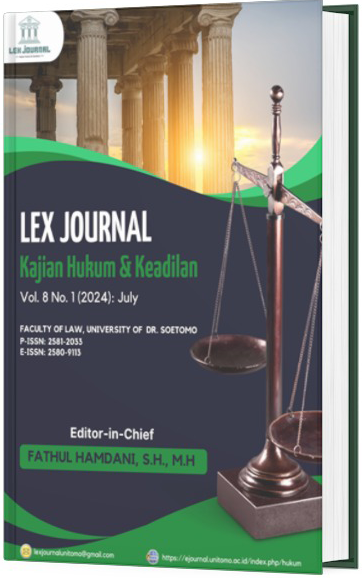Analysis of Human Cloning from the Perspectives of Natural Law, Legal Positivism, and Utilitarianism
 Abstract views: 188
,
Abstract views: 188
,
 PDF downloads: 115
PDF downloads: 115
Abstract
Today cloning has become “the hottest topic” in biotechnology and biomedical studies. The earliest opening questions about human cloning are: Will human cloning become normative on this planet? This seems to be a very simple question, but it is not enough to answer yes or no, it requires deep thinking. The purpose of this research is to analyze the issue of human cloning from the perspective of natural law, legal positivism, and utilitarianism. This research uses an interdisciplinary approach to explore different perspectives in answering the issue at hand. The results show that from the perspective of natural law, human cloning shows that humans have transcended their nature as creatures created by God and instead want to step over God as the creator of all life. While in the perspective of legal positivism, if cloning is done without going through a legal marriage process and can use eggs and any cells other than sperm from the husband and wife concerned, it is very clear that cloning of humans is contrary to or violates positive law in Indonesia (Health Law and Government Regulation on Reproductive Health). Then in the perspective of utilitarianism, the goal of Utilitarian theory can indeed be achieved because cloning can in fact avoid humans from distress or suffering, but this is only for some individuals because cloning does not provide benefits or happiness in a broad scope or in this case society as a whole, especially the lower middle class.
References
BOOKS
Bentham, Jeremy, An Introduction to the Principles of Morals and Legislation (Kitchener: Batoche Books, 2000).
Bertens, Kees, Etika (Jakarta: Gramedia Pustaka Utama, 2007).
Crowe, Michael Bertram, The Changing Profile of the Natural Law (Denhag: Martinus Nijhoff Publishers, 1977).
Geddert, Jeremy Seth, Hugo Grotius and the Modern Theology of Freedom: Transcending Natural Right (New York: Taylor & Francis, 2017).
Grotius, Hugo, The Rights of War and Peace, Jean Barbeyrac & Richard Tuck, eds (Indianapolis: Liberty Fund, 2005).
Hanafiah, M Jusuf & Amri, Etika Kedokteran & Hukum Kesehatan (Jakarta: Penerbit Buku Kedokteran EGC, 2017).
Ibrahim, Anis, Merekonstruksi Keilmuan Ilmu Hukum & Hukum Millennium Ketiga (Malang: In-Trans, 2007).
Kelsen, Hans, General Theory of Law and State (New York: Russel and Russel, 1971).
Pratimaratri, Uning, Kebijakan Hukum Pidana di Bidang Teknologi Reproduksi: Kloning University of Diponegoro, 2008) [unpublished].
Pudja, G & Tjokorda Rai Sudharta, Manawa Dharmasastra (Jakarta: Lembaga Penterjemah Kitab Suci Weda, 1973).
Rachels, James, Filsafat Moral (Yogyakarta: Kanisius, 2004).
Rahardjo, Satjipto, Hukum dan Perilaku: Hidup Baik Adalah Dasar Hukum yang Baik (Jakarta: Kompas Gramedia, 2009).
Susanto, Anton F, Dekonstruksi Hukum: Eksplorasi Teks dan Model Bacaan (Yogyakarta: Genta Publishing, 2010).
JOURNAL
Aman, ‘Kloning Manusia dan Masalah Sosial-Etik’ (2007) 1:1 Dimens J Kaji Sosiol 1–21.
Crowe, Michael Bertram, ‘The Impious Hypothesis: A Paradox in Hugo Grotius’ in Tom Campbell, ed, Grotius, Purfend Mod Nat Law (Brookfield: Ashgate Publishing Company, 1999).
Fauzia, Ana, Fathul Hamdani & Deva Gama Rizky Octavia, ‘The Revitalization of the Indonesian Legal System in the Order of Realizing the Ideal State Law’ (2021) 3:1 Progress Law Rev 12–25.
Hamdani, Fathul et al, ‘Fiksi Hukum: Idealita, Realita, dan Problematikanya di Masyarakat’ (2023) 1:2 Primagraha Law Rev 71–83.
Kertayasa, Herdian et al, ‘Peran Terekat Sufi Serta Relevansinya Terhadap Pendidikan Islam Modern’ (2021) 3:2 Edukatif J Ilmu Pendidik 549–561.
Rampadio, Hamdan, Ana Fauzia & Fathul Hamdani, ‘The urgency of arrangement regarding illicit enrichment in indonesia in order to eradication of corruption crimes by corporations’ (2022) 9:2 J Pembaharuan Huk 225–241.
Wiratraman, Herlambang P & Widodo D Putro, ‘Tantangan Metode Penelitian Interdisipliner dalam Pendidikan Hukum Indonesia’ (2019) 31:3 Mimb Huk 402–418.
Zamroni, ‘Rekayasa Genetika dalam Perspektif Islam (Kontroversi Kloning terhadap Manusia)’ (2007) 4:1 Mazahib.
WEBSITE
Andromeda, ‘Cloning dari Sudut Pandang Buddhis’, online: Samaggi-Phala <https://samaggi-phala.or.id/naskah-dhamma/cloning-dari-sudut-pandang-buddhis/>.
Badan Pembinaan Hukum Nasional, ‘No Title’, (2012), online: <https://bphn.go.id/data/documents/pkj_2012_-_4.pdf>.
Biologi Media Centre, ‘Bioteknologi (3): Eve, Kloning Manusia Pertama’, (2016), online: <https://biologimediacentre.com/eve-kloning-manusia-pertama/#:~:text=Melalui teknologi cloning%2C siapapun bisa diduplikasi. Clonaid%2C perusahaan,Clonaid tahun 2002. Dari 10 implan%2C lima gagal.>.
Faizin, Khoirul, Human Cloning dalam Tinjauan Filsafat Moral (2020).
Fauziyah, Yulia, ‘Reproduksi Kloning: Ditinjau dari Etika dan Hukum’, online: Globethics <https://repository.globethics.net/bitstream/handle/20.500.12424/207647/focus80.pdf?sequence=1&isAllowed=y>.
Hamdani, Fathul, ‘Isu Kloning Pada Manusia: Perspektif Utilitarianisme, Hukum Kodrat, Dan Positivisme Hukum’, (2022), online: Scribd <https://www.scribd.com/document/640965897/ISU-KLONING-PADA-MANUSIA-PERSPEKTIF-UTILITARIANISME-HUKUM-KODRAT-DAN-POSITIVISME-HUKUM>.
Simulasi Kredit, ‘Keuntungan dan Kerugian Kloning Manusia’, online: <https://www.simulasikredit.com/keuntungan-dan-kerugian-kloning-manusia/#:~:text=Tak hanya itu%2C kloning manusia,mengobati penyakit dan kelainan genetik>.
Tim Siap Nikah, ‘Yuk Intip Syarat Pernikahan Menurut Agama Hindu’, (2020), online: <https://siapnikah.org/yuk-intip-syarat-pernikahan-menurut-agama-hindu/#:~:text=Dilansir dari Mutiara Hindu%2C perkawinan,tertuang pada Kitab Manawa Dharmasastra.>.
Tunardy, Wibowo T, ‘Aliran Hukum Alam’, (2020), online: <https://jurnalhukum.com/aliran-hukum-alam/>.
Copyright (c) 2024 Eduard Awang Maha Putra, Febrian Rizki Pratama, Muhammad Azimuddin Mohamed

This work is licensed under a Creative Commons Attribution-ShareAlike 4.0 International License.









